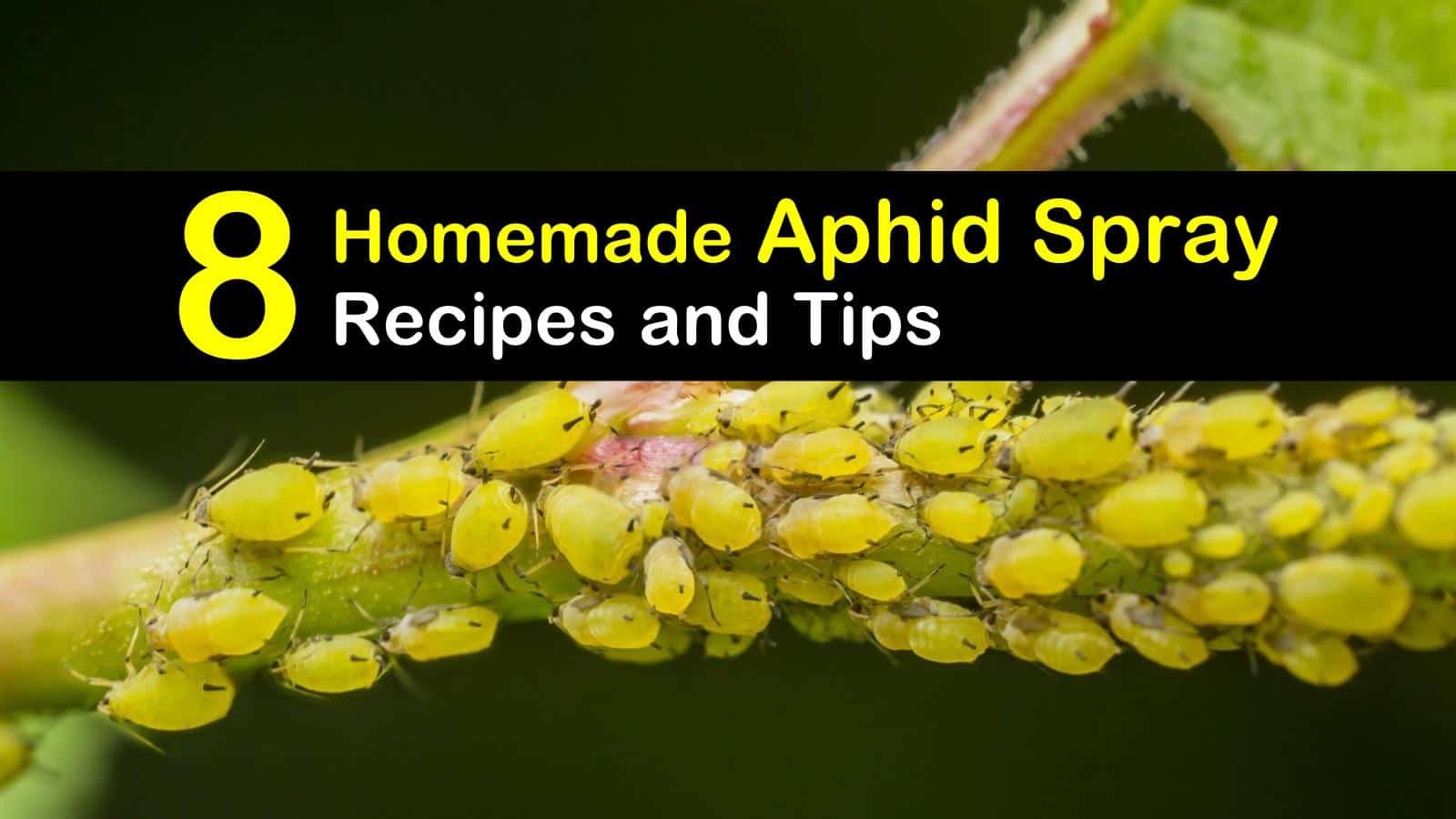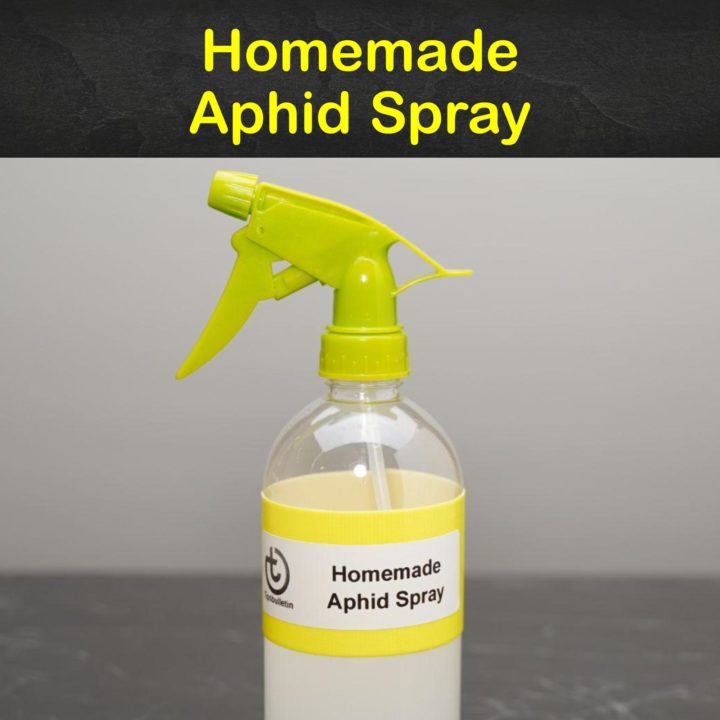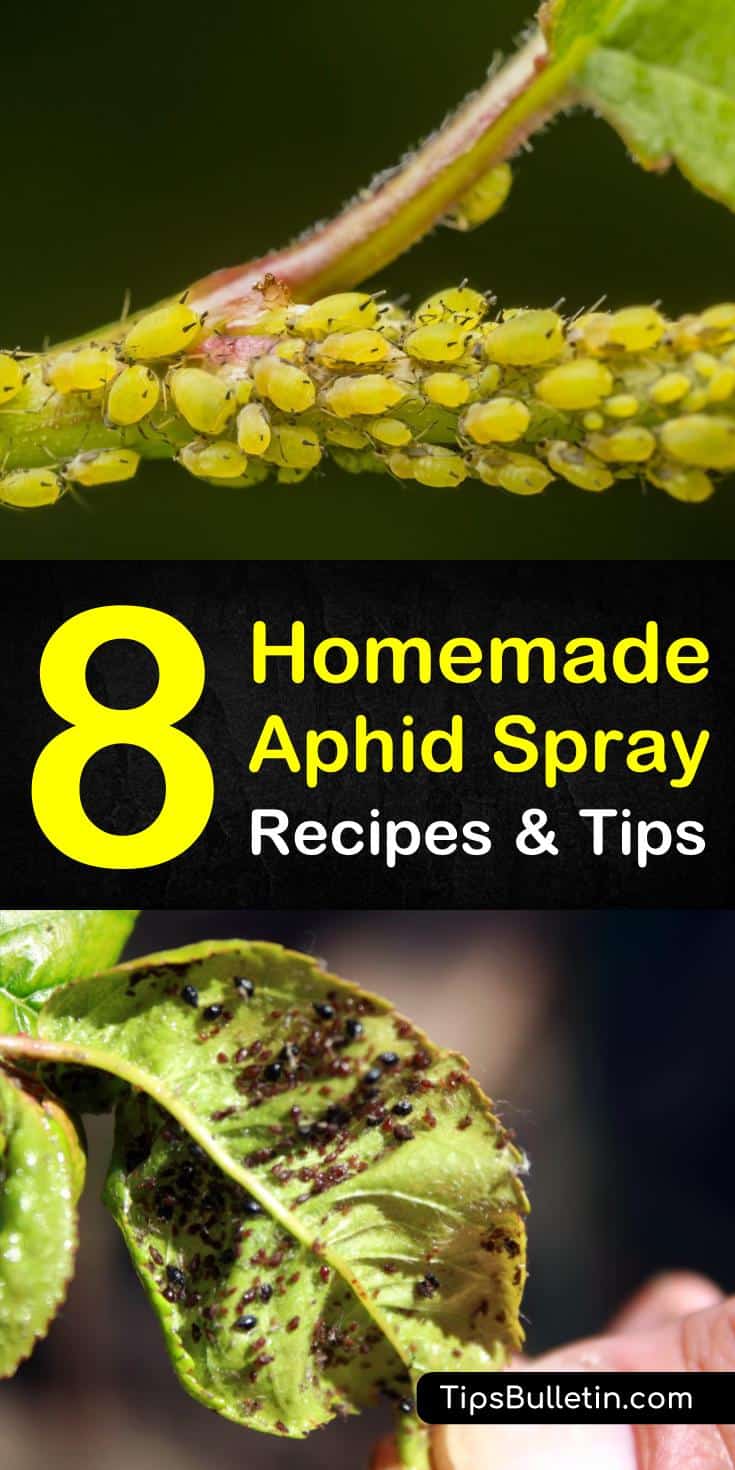If you have a vegetable garden, you most likely have aphids, too. The small insect pests, known as “plant lice,” feed off plants by attaching to the leaves or base of the entire plant and suck out the nutrients, causing the plant to wither, yellow or curl at the leaves.
Aphid populations reproduce so quickly that by the time you figure out the problem, they’ve already infested your garden and potentially infected your plants and rose bushes with lethal viruses.
You can fight off these natural predators with a homemade aphid spray, but the question is how to make them yourself. Using something as simple as liquid dish soap, you can get rid of these apex rose killers today.

Homemade Sprays vs. Chemical Sprays
Some people choose to plant gardens full of beneficial fruits and vegetables to feed their families. Using chemical pesticides to remove pests would negate any health benefits hoping to be gained.
Others might plant flowers that they use to create a fragrant home, potentially transferring harmful chemicals from the garden to their home. Numerous natural and organic substances can be mixed to form a natural aphid spray to kill invasive aphids, lace bugs, and parasitic wasps.
Homemade Aphid Spray Recipes
Soap and Water
A few tablespoons of liquid dish or insecticidal soap diluted in a pint of water is the simplest way to make a natural aphid killer spray for that aphid infestation. After mixing the water and soap mixture, fill up a squirt bottle, take a dish sponge and head out to your garden.
Your first thought might be to indiscriminately spray all the plants in your garden with the dish soap spray bottle. However, doing so will kill any beneficial insects along with the aphids.
Instead, to control aphids but not lose your good bugs, spray the soapy water onto the sponge and gently wipe it on the leaves of the plants. Be sure to check underneath the plant leaves for eggs and larvae.

Vinegar
Castile soap is a versatile all-natural, vegetable-based liquid soap with olive and mineral oil as the main ingredients. When combined with vinegar and water, Castile makes a DIY natural aphid spray. The vinegar deters future garden pests from invading your new growth.
Like dishwashing soap, vinegar is lethal to all insects, whether they are the Japanese species of aphids you are trying to get rid of or the good bugs you need in your garden. Use a spray bottle to spray the tops and bottoms of the leaves lightly.
Neem Oil
Pure and organic Neem oil can be used to repel aphids, cabbage worms, and other pests, as well as help control any fungi they transfer into your garden. Simply mix Neem oil for plants with a few drops of liquid dish soap and fife cups of water.
Once you dilute the Neem oil, use a garden hose sprayer to mist your garden with the mixture in the early morning. Neem oil doesn’t have any harmful effects on beneficial insects, but it does help in repelling aphids, mosquitoes, and other pests.
Spray this solution on all your plants, from the tomatoes and cucumbers in the vegetable garden to flowers like roses and milkweed to the base of trees to repel unwanted aphids and other pesky insects. Your plants will thank you for ridding them of these life-sucking creatures!
Essential Oils
Essential oils have long been used in aromatherapy but are recently becoming popular in many aspects of the home, including pest control for gardens. A mixture of thyme, peppermint, cloves and rosemary oils create a potent mix that will kill and repel aphids.
If you have outdoor or stray cats who routinely enter your garden, peppermint oil is one of the essential oils that are known to be potentially toxic to cats. On the other hand, cats dislike the scent of rosemary, which can make it a digging deterrent.
Tomato Leaf Spray
Toxic compounds called alkaloids are found in the leaves of tomato plants. These tomato leaves can be chopped, soaked in water overnight, drained and diluted with water in a spray bottle to create a natural aphid killer.
Unless you are allergic to tomatoes, this recipe isn’t dangerous for humans or plants. Directly spray the leaves and undersides of plants in your garden to kill the harmful plant lice.
Garlic Oil Spray
Garlic isn’t just used to repel vampires. The sulfur in garlic is toxic to pests. It also kills ladybugs and other beneficial insects. For that reason, this garlic-based natural aphid spray should only be used if you don’t have any essential bugs in your garden.
Add garlic to the vegetable oil and let it infuse for 24 hours. Strain the garlic and add oil to water and dish detergent. Mix well and spray on bugs for a natural aphid killer.
Getting Rid of Spider Mites
Spider mites are another tiny pest that can cause big problems in your garden. If the leaves of your plants are dry, brittle or falling off, you might be dealing with a spider mite infestation.
The insects are tiny and cause immense damage to healthy plants quickly by poking holes in the leaves and extracting the water and nutrients that are the lifeline for your plants.
Neem oil is one practical solution for getting rid of spider mites. Follow the directions above by diluting neem oil with water and spraying on the leaves and the undersides of leaves to repel the mites.
Homemade Aphid Control – Prevention
As Ben Franklin said, “An ounce of prevention is worth a pound of cure.” He was talking about fire safety, but it is often applied to health safety. Or in this case, garden safety. There are a few things you can do to prevent invasive insects such as aphids or spider mites from infesting your garden.
Attract Favorable Bugs
Lady beetles and lacewings are two insects that feed on aphids. Introducing them to your garden is a natural selection way to combating their infestations while keeping the beneficial bugs safe from chemical pesticides.
There are two main ways to get the “good” bugs; acquire them at gardening stores or turn your garden into a habitat with an ample supply of nectar to attract the helpful kind of insects.
Apply Dormant Oil
Dormant oil is a mixture of several oils and water that is applied to plants during their dormant season to repel aphids after the wintering is over. The mixture shouldn’t harm beneficial insects because they won’t be the plants during the inactive phase.
Combine water and baking soda with canola oil. Pour the mixture into a spray bottle and mist onto the leaves and undersides of the dormant plants.
Plant Fragrant Herbs
Some herbs are so fragrant that their smell repels aphids and other harmful pests. Planting these herbs throughout the garden can naturally prevent aphids from infesting your plants.
Oregano, garlic, and chives are three herbs that are effective in repelling aphids. Cayenne peppers are also known to successfully prevent critters and insects if you like peppers with some kick.
You can sprinkle natural diatomaceous earth on the insects since it sticks to them and causes them to dry out, leaving you “aphid-free.”
How Does Your Garden Grow? Mother Goose asked this question in a child’s rhyme game. After you’ve tried these natural aphid sprays, you can answer that your garden grows harmoniously.
Recipe for Homemade Aphid Spray

Homemade Aphid Spray
Keep aphids from eating your plants.
Materials
- 9 1/2 cups water
- 1/2 tbsp vinegar
- 1/2 tbsp dish soap
Tools
- Measuring cup
- Tablespoon
- Garden sprayer
Instructions
- Add the soap, water, and vinegar to the spray bottle.
- Shake the mixture.
- Spray all parts of the plant, including both sides of leaves and the stems to kill current aphids and deter others.
Notes
This bug killer eliminates all kinds of pesky insects.

We hope you like these homemade tips and recipes for homemade aphid spray. If you liked this article, be sure to share it on Pinterest and Facebook with your family and friends.